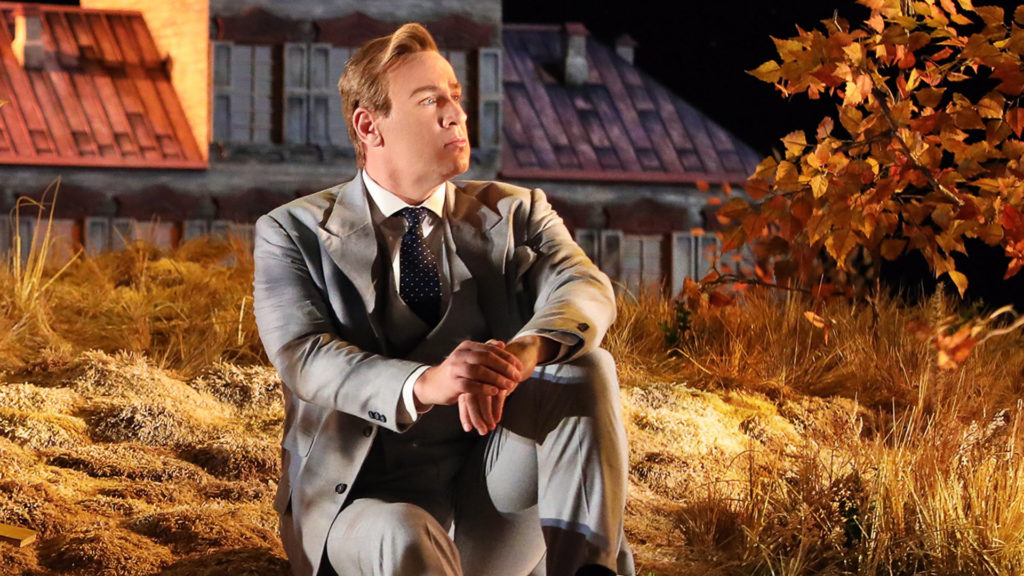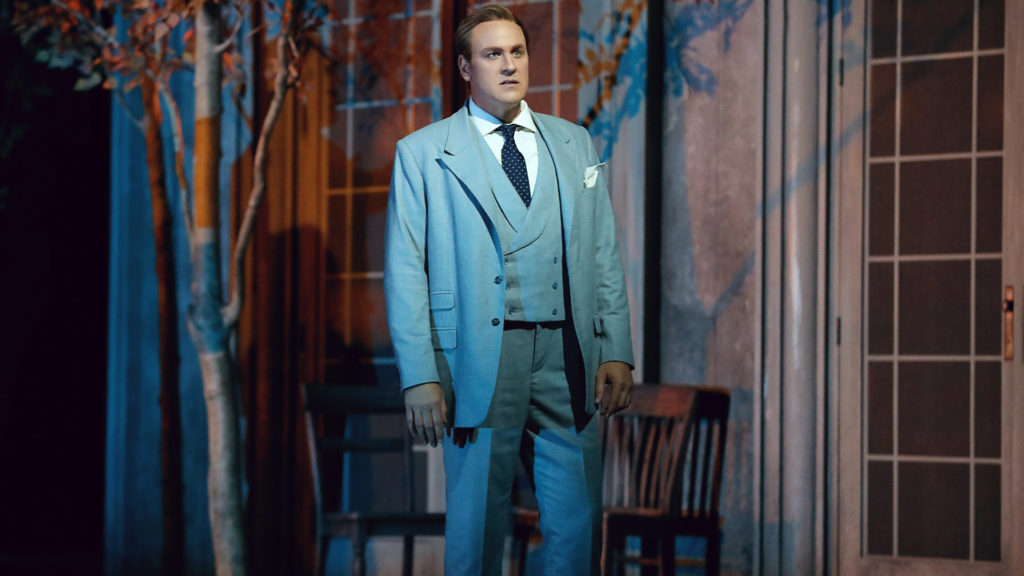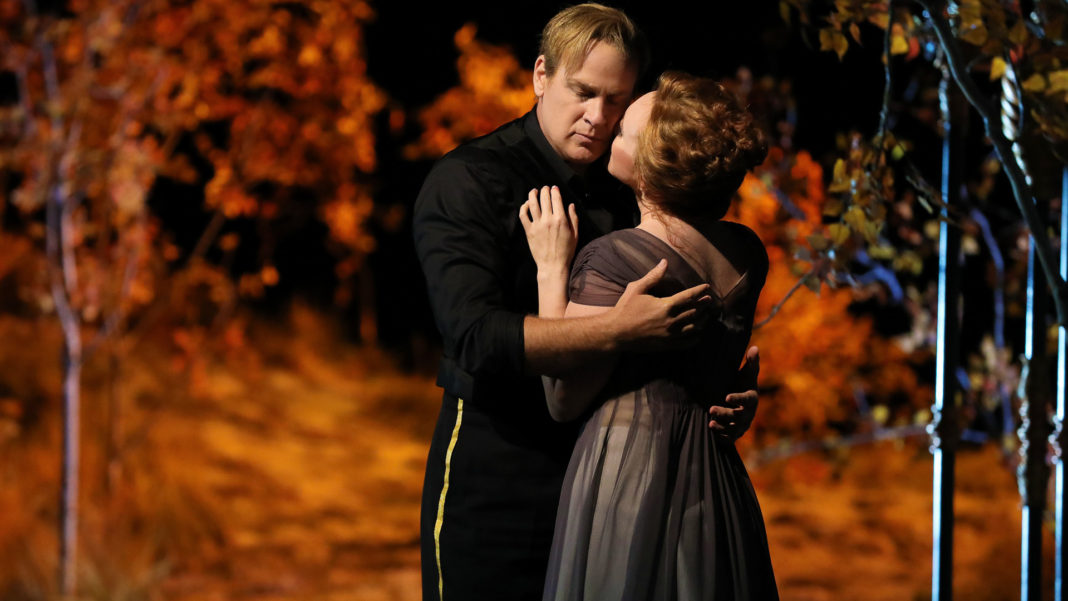It’s a tale as old as time. The star gets sick and the understudy, with little or no notice, has to go on. That’s what happened when baritone Lucas Meachem first performed the title role in Tchaikovsky’s Eugene Onegin.
“I was a young artist at San Francisco Opera at the time. They gave me the cover assignment six months in advance. I was assigned the role of Onegin. I knew it was one of the signature baritone roles in the repertoire,” Meachem recalls. “I was eating spaghetti and meatballs at a little Italian place about a block-and-a-half from the opera. They called me around 6:30 for a 7:30 curtain. They said, ‘What do you need?’ I need to fire the gun. I need to dance with Olga and I need John Churchwell, now head of music at San Francisco Opera, in my dressing room all night long.”
The rest, as they say, is history. Last week week I spoke with Meachem via Zoom to discuss another last-minute opportunity to sing what is now one of his signature roles at Santa Fe Opera. The previously announced Etienne Dupuis was unable to perform due to international travel restrictions (as was his wife, Nicole Car, who was set to sing Tatyana, creating an opportunity for soprano Sara Jakubiak.)
What follows are excerpts from our conversation that have been edited for length and clarity.
You’ve sung Onegin in other productions. When you embark on a new production, as you are here with director Alessandro Talevi, at what point do you know if the production is going to be a successful one?
I’ve done traditional and non-traditional productions. I’ve only done one non-traditional production. For ten days to two weeks it was like banging my head against the wall. Ultimately I came to love it. It came to be, up until this one, my favorite production of Onegin. I had to buy in. If a director can have an artist buy into their vision, that’s the most important thing. I have to believe it. Because if I believe it I can make the audience believe it. I believe this production. I totally buy it.

Since you first took on this role in the early 2000s, how has your relationship with it evolved?
The biggest thing that has evolved is my voice; my ability to handle the nuances of the role. What I mean is the arc of the character from beginning to end. That is something I didn’t grasp as a younger Onegin. Now that I’m older I’m able to see that this character needs to start feeling like he knows everything there is to know in the world, who has experienced everything and doesn’t expect that life is going to throw him any curveballs.
On your website you call this your second favorite role to sing. What will need to happen for it to bump The Barber of Seville from the number one spot?
I have so much respect for Figaro in The Barber of Seville because that character and that man have shown me the world as a young singer. I have now gotten to see so many places singing that signature role of mine. For Onegin to take over, I think it would have to show my son the world. Don’t get me wrong, it teeter-totters close to first very easily. It’s a beautiful role.
Santa Fe Opera’s marketing materials say that this production centers on the opera’s “nostalgic theme of what was, what was not and what could have been.” How do you think Tchaikovsky’s career and perhaps his take on this opera might have been different had he been able to be open about his homosexuality?
I think the relationship between Lensky and Onegin would be a lot more at the forefront of this piece and there might be more of a flirtatious loving vibe between them. There’s not much of that. I have to create that between him and me. I feel like he takes advantage of Lensky the whole time and the love he has for him only comes across in asides after we’ve gone too far to come back.
That description I mentioned also sounds like a way of looking at life in the time of COVID.
I think people can see in art a reflection of themselves and of the moment that we live in. Rather than art being just a plain snapshot of the moment, it is also a snapshot of the past and the future and would could have been. I think people will see in Onegin the difficulties we’ve been through in the last sixteen months.

You and Sara Jakubiak are not just appearing in Eugene Onegin at Santa Fe Opera, but will also be in a production of Wagner’s Tannhäuser at Los Angeles Opera in the fall. How would you describe the chemistry the two of you share when performing?
I think Alessandro said it best on the first day that Sara rehearsed. We were rehearsing a scene where she doesn’t sing. It was right after her big aria and she’s just acting and her face – even with a mask – she’s acting and Alessandro said to her, “You could be a silent film actress.” Her voice is beautiful and amazing, but she is an amazing actress. Everything is in her eyes. We have a lot of chemistry on stage and I think the audience really felt that on our opening night.
Tchaikovsky said “Music possesses much richer means of expression and it is more subtle medium for translating the 1000 shifting moments of the feelings of the soul.” Do you agree with that description?
I absolutely agree. I think when we talk about music we need to really speak about opera because it’s not the grandest of all art forms for no reason. You combine singing with the orchestra, with lighting, with sets and wigs and makeup, with all the many ingredients that it takes to make grand opera. It seems like an impossible endeavor just to start out with. All of a sudden you’re able to do it. That’s what keeps audience coming back to this centuries old art form. It speaks right to the heart.
The most important thing in art is that you are honest with your audience. This is probably the most difficult thing as an artist to achieve. Even in my career I still have moments where I say “don’t forget to be honest.” Those are the 1000 emotions that he’s speaking of – the honesty that speaks right to the heart of someone who is listening. The music that hits you in the heart is the music that is honest to you. That’s where people get their thousands of emotions from. It’s not just from music, but art itself. That’s what makes art so vital to a culture.
For tickets to Eugene Onegin please go here. There are performances on August 6th, 12th, 20th and 26th at Santa Fe Opera.
This is the fifth in a series of interviews with artists performing this season at Santa Fe Opera. The sixth interview will be with Sara Jakubiak on her role as Tatyana in Eugene Onegin.
Photo: Lucas Meachem and Sara Jakubiak in Eugene Onegin. (Photo by Curtis Brown/Courtesy Santa Fe Opera)












